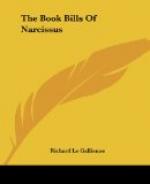CHAPTER VII
THE CHILDREN OF APOLLO
‘He is a true poet,’ or ‘He is a genuine artist,’ are phrases which irritate one day after day in modern criticism. One had thought that ‘poet’ and ‘artist’ were enough; but there must be a need, we regretfully suppose, for these re-enforcing qualifications; and there can be but the one, that the false in each kind do so exceedingly abound, that none can be taken as genuine without such special certificate. The widespread confusion with the poet of the rhetorician and sentimentalist in verse, and again of the mere rhymer without even rhetoric, not to refer to finer differentiation of error, is also a fruitful source of bewilderment. The misuse of the word has parallels: for instance, the spurious generic use of the word ‘man’ for ‘male,’ the substitution of ‘artist’ for ‘painter.’ But here we have only to deal with that one particular abuse. Some rules how to know a poet may conceivably be of interest, though of no greater value.
Of course, the one first and last test is his work, but ’how to know poetry’ is another matter, which I do not propose treating of here; my intention rather being to dot down a few personal characteristics—not so much his ‘works’ as his ‘ways.’ I write as they come into my head; and to any Reader about to cry out against digression, let me add: I write thinking of Narcissus; for know all men, friend or Philistine, if you have yet to learn it, my Narcissus is a poet!
First, as to the great question of ‘garmenting.’ The superstition that the hat and the cloak ‘does it’ has gone out in mockery, but only that the other superstition might reign in its stead—that the hat and cloak cannot do it. Because one great poet dispensed with ‘pontificals,’ and yet brought the fire from heaven, henceforward ‘pontificals’ are humbug, and the wearer thereof but charlatan, despite—’the master yonder in the isle.’ Pegasus must pack in favour of a British hunter, and even the poet at last wear the smug regimentals of mediocrity and mammon. Ye




